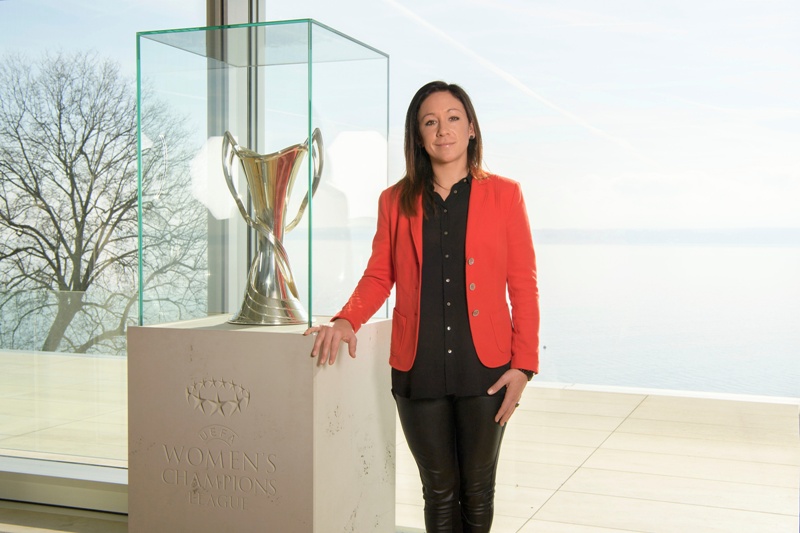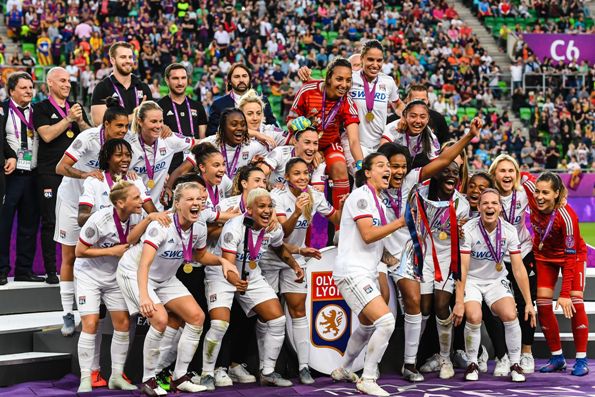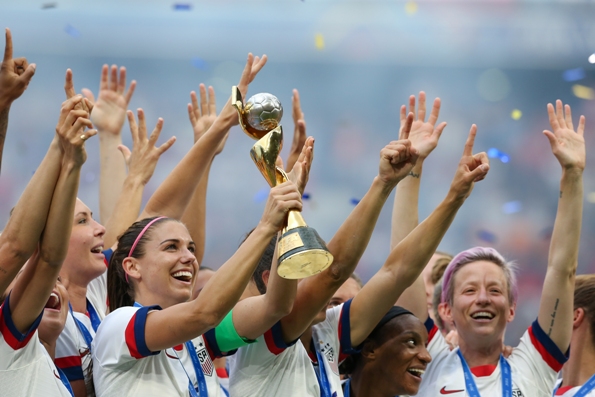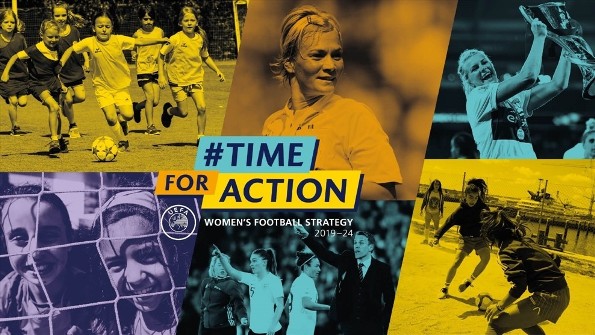Nadine Kessler: Leading The Way

Following a glittering playing career ended prematurely through injury, Nadine Kessler is leading UEFA’s Women’s Football Strategy 2019-24, a five-year strategic framework with the aim of supporting, guiding and lifting both women’s football and women in football across Europe.
FC: You had a very successful career as a player but how have you found the transition to executive level?
NK: It was a tough transition and it took me a while to get there. Things on and off the pitch sometimes slightly differ and I can certainly say that it isn’t a given that if you’ve been a good player you will automatically become a good football administrator. You have to work hard, adapt quickly and be ready to learn a lot relatively quickly. However, for me personally whilst doing all of this, it was also important to take my time to assess the environment I am in properly and then take a direction forward.
I have a lot of responsibility for women’s football in Europe, but also for my team at UEFA, and I don’t take this lightly. Therefore, it was of utmost importance for me to grow as quickly as possible in to my new role with the aim to become as good as I can be. I have had to learn a lot, but I can say now that I am lucky to have gained the expertise that is needed to meet expectations. At the time of my appointment it was important for me to be judged on my work and not the fact that I had a successful playing career.
Do you think your experience as a player has helped shape the UEFA Women’s Football Strategy?
My experience as a player has definitely helped me, but it took me a while to understand exactly how. In the first place, I thought that the world of football administration and the world of playing football professionally were more different than they really are. For example, how do you unite a team if there is no opportunity of a Champions League trophy at the end of the season? I soon realised that there is always another overarching goal or set of subgoals that everybody can strive for instead.
You just have to get to know and understand people, find a common ground and appreciate different perspectives. In the process of shaping the UEFA Women’s Football Strategy, but also of building a team in general at UEFA, this approach really helped me. I’ve been leading teams as captain in many of my clubs from the age of 16, which has helped me to gain an understanding of how to approach people with different needs and perspectives but still unite them for a common goal.
I am also a person that is heavily driven by a big picture in my head of where I want the journey to end. This gives me enough motivation to keep going if things don’t work out in the first place, resilience when it’s needed, belief to make it happen and focus to deliver it with the best ambitions in mind. I guess it is this way of approaching things I have developed through being a professional footballer.
Last but not least, understand that the collective is stronger than the individual. This is the case everywhere in life and in the delivery of the UEFA Women’s Football Strategy, which is why the whole organisation is concerned with delivering it. Regardless of how minor the contribution of an individual is, everybody is important and of great value for the overall success of the project. A football team is exactly the same. I have probably left my footballer stamp on the strategy. I know that I have been strong in ensuring that we looked and considered everything with the individual in mind, whether that be the coach, player, referee, fan or administrator, whether they are in it for fun or as a professional.
What are your thoughts on the way in which women’s football has developed over the years?
I think the buzz women’s football creates at the moment is brilliant. It is really going from strength to strength, whether it be more girls playing in parks or women having a professional environment to play with full stadia!

Champions: Olympique Lyonnais women with UEFA Women’s Champions League trophy v FC Barcelona women on May 18, 2018 at Ferencvaros Stadium in Budapest, Hungary
We can attribute this to the general growth of the sport and growth in popularity, but also it’s the strong impact that it has to challenge socio-cultural issues. This is really important and we all know the power that football has to impact good beyond the field of play. To further push the boundaries in the future and as football flourishes we should also be proud to celebrate it for what it is – sporting excellence. This is what we want ultimately, because when we have reached this stage, perceptions of women and girls in society will have changed. It will be the most normal thing in the world for a girl to become a footballer.
Girls just want to play football because it is fun, they meet friends or because they want to play for their national team. I hope that more and more we can discuss football – the game itself.
Were there any barriers or hurdles that you had to overcome in your pursuit to become a professional footballer and what did you do to counter them?
I suffered many, many injuries from a young age onward. This obviously caused a lot of disbelief and mistrust from coaches who thought I could never be on top of my game resulting in lost opportunities to play for the national team and ultimately be successful.
I stopped at the age of 28 due to 11 surgeries on my knee, which was way too early in my career and I was being assigned with the status of invalidity. But still I can say proudly that I managed to achieve more than I could ever have dreamed of. With every surgery I had, the more I had to work harder to counter the weaknesses on my body.
This sport gave me so much, taught me many lessons, life skills, what I want and what I don’t want and how to continue my way regardless of what is put in my way. I guess if people tell you that you won’t make it, you just have to put that aside, put things in perspective and continue to believe in yourself. I was always very self-critical, my own worst enemy at times, but self-reflection helps you to still know what is possible and what is not.
A healthy judgement of yourself gives you enough argumentation and therefore strength and confidence to sometimes decide to go your own way. It is important to say your opinion and stay true to yourself, which is sometimes not easy, particularly in difficult situations, but for me it was crucial to keep on track, and to be able to look in the mirror and disregard irrelevant opinions.
Lastly, you need to have a plan, but you also need to be a dreamer and imagine the ultimate possible scenario you want for yourself. This can be especially difficult when you are not a full-time professional, where you have other commitments besides football, such as another job, which is the case for a lot of athletes, not just female football players.
Do you feel it is your duty to ensure the barriers you faced are removed for future generations of girls to be able to play football at the top level?
I played as the only girl in a boys’ team from the age of four up to the age of 16; there was not really an option to play with girls. Looking back, I am really happy about this experience and that my mum and dad made the decisions that they did. Although it was tough in the beginning, and obviously some boys had a problem with me, it was ok after a while. I was better than the boys in the team, which made them realise that they needed me.
Such a pathway can be a barrier for some girls as well as the fact that it might be perceived as not the right choice for a girl to play football. Lacking support from the family and the closest people around them can also have a tremendous impact on girls’ lives, something I luckily didn’t experience. But all of this, and the experience I gather on a daily basis in my job, certainly makes me want to ensure that there are enough opportunities for girls to partake in the sport, as well as the necessary support and encouragement to do so.

Alex Morgan of USA celebrates with the trophy after the FIFA Women’s World Cup match at Stade de Lyon, Lyon.
Do you believe that women will eventually achieve parity in regards to earnings to that of their male counterparts?
First of all I think to answer this question accurately it is important to distinguish between different markets and regions across the world; every situation needs to be assessed individually for respective countries, as they may differ. It is also the case that football does lead the way in many aspects linked to parity when you look at other team sports.
In my view and from a European perspective, I think parity is only possible when the women’s game succeeds in establishing the sport on a sustainable financial ground and therefore the economics of women’s football change. This is something we cannot disregard, and this is also why it’s so important to get partners on board that solely support the women’s game. We need to invest more in the sport with a view to the future from now on, ensuring that it is strategically and appropriately placed so that our players have the right environment to thrive.
The efforts of female and male players are the same, opportunities in terms of standards/environments should be the same to perform on the highest possible level or in safe environments at a grassroots level, but in order to guarantee parity in terms of earnings, we need to generate more revenue. A first or second league women’s player doesn’t earn as much as a women’s player that also represents her country. The effort is still the same and both play as professionals, but earnings differ because the women’s national team player has a direct impact in terms of the brand value she creates for her national team and country; the bigger exposure she creates is reflected in her higher salary.
Do you think professional football clubs are now starting to see the full value of investing in their women’s teams and what more can they do to help grow the game further?
I believe so. Many professional men’s clubs have identified the value of investing in the women’s game, which is an important factor of the game’s current growth in Europe. The more they get behind it, the bigger the visibility and exposure for the sport will be, and the more opportunities are there for girls to play. Those clubs can welcome many more girls than smaller clubs in a short period of time, and they also have the means to provide good and safe playing conditions, as well as well qualified coaches. In return, by integrating women’s sections and teams into professional clubs, they can certainly amplify the value of the club’s brand. A different and wider audience can be engaged next to those following the men’s, and different partners with different interest can be bound with the club. It also means that an additional source of exposure is guaranteed.
There have been record attendances set at women’s league games in Spain and Italy. How can the game capitalise on that?
It’s fantastic to see those attendances and it is exhilarating for the players to play in front of such big crowds. It shows us that women’s football really is reaching new heights and that there is an appetite for the game like never before. Five European women’s leagues have broken their domestic club attendance records this year and many records were set in national team football.
We have already seen some in the FIFA Women’s World Cup and it is almost a competition in itself on who can get the biggest crowd, which for this stage in the development of the game is a great way to enhance exposure and create a buzz that we all can capitalise on. We need to take all these games as best practice and learn from the strategies used to fill the stadia but also understand the motivations for the fan to come to a women’s game. We need to constantly engage with wider audiences as the women’s game can still draw in new followers.
Does it give you a sense of pride to see more and more young women and girls taking up the game?
Absolutely, I love it. This is what I’ve played for and now work for. It’s just great to see that football becomes a more natural choice for girls, which means we are on the right track of changing perceptions around the world and that efforts to make the sport more accessible are paying off. All I ever wanted was to be a footballer, so it fills me with pride that more and more girls feel the same. There is also not really any reason why girls shouldn’t fall in love with this game the same way boys do.
##
UEFA Women’s Football Strategy
fcbusiness asked European football’s governing body UEFA a number of key questions relating to the strategy and what they hope to achieve from the initiative.
Why Now?
UEFA has been investing in the women’s game for a long time and has taken a number of significant steps such as the introduction of a women’s football unit, increasing the budget for women’s football development projects at national associations, unbundling sponsorship packages from the men’s competitions and giving the UEFA Women’s Champions League final a stage on its own for the first time. With the introduction of its first ever strategy for women’s football in May 2019 as part of the over arching ‘Together for the Future of Football’ strategy launched in February 2019, UEFA now has a framework, a direction and clear goals to work towards.
Growing Interest & Commercial Value
Women’s football has seen unprecedented growth and momentum at every level and all across Europe. The public, media, organisations and professional clubs are starting to see its quality and are beginning to ignore previous ill-perceived perceptions. It is becoming increasingly evident that the sport is seeing the huge potential for wide-ranging growth and that it has the ability to become a lucrative product in its own right. Across Europe there is bigger investment than ever from clubs, member associations and partners alike which has led to greater exposure and visibility and a greater appetite for involvement.
Increasing Participation
UEFA works directly with member associations on policies and strategies to ensure that there are opportunities for girls to play football and will continue to grow its #weplaystrong campaign and positioning its competitions in order to inspire girls to play. UEFA are developing a dedicated grassroots programme that will look at creating the right environments for girls at the youngest age to start playing.
Creating Pathways & Breaking Down Barriers
Pathways for players of any ability are really important to ensure the growth of the game; unfortunately they are not consistent across Europe. As part of the Women’s Football Strategy, UEFA are trying to ensure that there is an appropriate path for every girl and woman.
Changing Perceptions
There is huge momentum building which will help establish women’s football in the mainstream and normalise the game for women and girls. The development and perception of the game is very different across the continent and unfortunately girls and women playing football is not accepted everywhere. By giving better positioning to the women’s game, greater visibility to competitions and role models within the sport, UEFA aims to change attitudes positively, with sponsors and the media playing a huge role in this.
Increasing Standards
There is a huge need for more female coaches in the game and UEFA needs to provide more opportunities for them. As part of the strategy there will be more scholarships than ever for female coaches via UEFA’s national associations and they will continue to grow mentorship opportunities for young aspiring female coaches.
Female Executive Board Representation
In the last committee appointments (May 2019) there was an increase from 34 female members in nine committees to 54 members in sixteen committees. UEFA have started, and will continue, to conduct a thorough review of its bodies including, gender, diversity, expertise, process and caps before the next appointments in 2023, and will encourage national associations to put women forward for the various committees, not only those in women’s football.
Identifying suitably qualified and talented female executives through programmes such as the UEFA Women in Football Leadership Programme will ensure representation continues to grow. But UEFA will seek national associations to put forward good and knowledgeable individuals from within their football structures.
Images: PA Images




